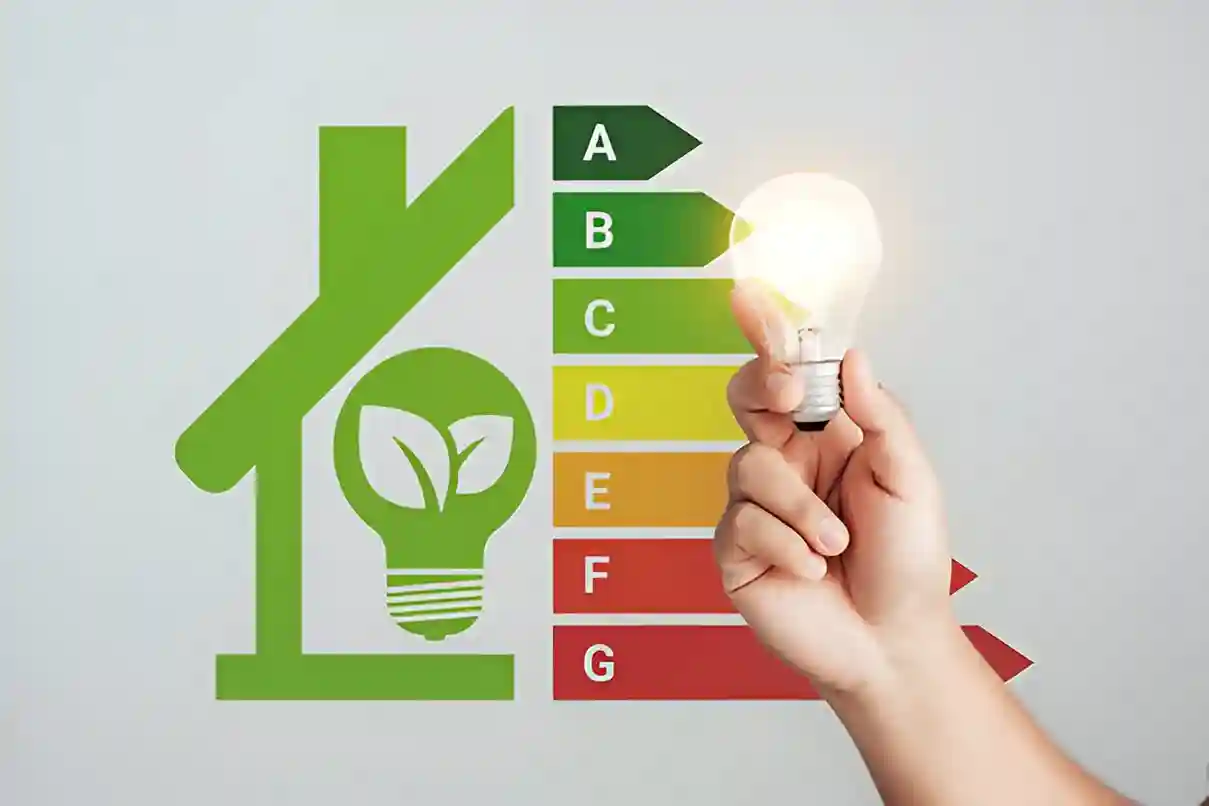
EPC ratings will play a significant role for homes and businesses by 2025, influencing energy efficiency and market appeal. As regulations tighten, it becomes integral to understand these ratings. Property owners should consider steps to improve their energy performance to stay compliant with upcoming standards. These actions could also shape their long-term sustainability plans.
Key Takeaways
- EPC measures energy efficiency; higher ratings result in lower energy bills and decreased environmental impact for homes and businesses.
- A minimum EPC rating of E or higher will be required for rental properties starting in 2025, affecting both compliance and marketability.
- Enhancing insulation, heating, and lighting can boost performance, leading to savings over time and increased tenant comfort.
- Businesses with stronger ratings experience lower operational costs and enhanced market competitiveness.
- Upcoming regulations might necessitate higher ratings, highlighting the importance of ongoing energy efficiency upgrades and adherence.
Understanding EPC Ratings and Their Importance
An Energy Performance Certificate (EPC) rating acts as an essential indicator of a property’s energy efficiency, whether residential or commercial. Provided by certified assessors, the rating scale ranges from A to G, where A signifies the highest efficiency and G the lowest. This system not only reflects a property’s energy consumption but also emphasises its environmental footprint.
Understanding an EPC is essential for prospective buyers or tenants because it affects choices regarding property purchases and rentals. Properties with higher EPC usually incur lower energy bills and have a reduced carbon footprint, which makes them more appealing in a market that emphasises sustainability.
Furthermore, numerous governments are introducing regulations that set minimum ratings for properties, impacting their marketability and compliance. As a result, an energy performance certificate is more than just a paper; it serves as an essential tool for making informed decisions in real estate.
How EPC Ratings Are Calculated
The process of assigning an EPC rating involves analysing several components of a property’s energy efficiency. This process assesses the building’s energy efficiency and its impact on environmental sustainability.
Key elements influencing the rating include:
- Insulation Quality: The efficiency of insulation materials used in walls, roofs, and floors.
- Energy Use: The property’s total energy use, covering lighting and appliances.
- Renewable Energy Sources: The presence of solar panels or other renewable energy technologies that help save energy.
A qualified assessor usually performs this evaluation with standardised software to ensure precise and consistent ratings.
The EPC Rating Scale: From A to G
The Energy Performance Rating scale, from A to G, indicates a property’s energy efficiency. An ‘A’ rating indicates excellent energy performance, meaning the property is very efficient and likely to have lower energy costs. In contrast, a ‘G’ rating reflects the lowest efficiency level, indicating that the property may require extensive upgrades to improve energy efficiency and reduce expenses.
Properties with ratings from A to C are typically seen as desirable because they provide improved sustainability and comfort. Ratings of D and E may require upgrades to comply with current energy standards, whereas ratings of F and G can negatively impact marketability and lead to higher operational expenses.
Understanding this scale is essential for homeowners and businesses because it influences energy use, environmental impact, and financial outcomes. Knowing ratings helps make informed choices about property investments and improving energy efficiency.
The EPC Rating Scale: From A to G
EPC ratings are essential for evaluating a property’s energy efficiency, ranging from A to G. An “A” rating signifies excellent energy performance, whereas a “G” rating indicates poor efficiency. Key aspects of the rating scale include:
- A Rating: Indicates a very high level of energy efficiency, resulting in lower energy costs.
- B Rating: Represents above-average efficiency, still offering significant savings.
- C Rating: Denotes average efficiency; improvements may be needed for better performance.
- D to G Ratings: Indicate below-average to poor efficiency, suggesting urgent upgrades are necessary.
Knowing a property’s position on this scale can inform energy upgrade choices, boost property value, and support sustainable living.

EPC Ratings and Rental Properties: What Landlords Need to Know
Landlords should be mindful of ratings’ implications for rental properties, particularly as energy efficiency gains importance in the housing market. Regulations now require properties to have at least a rating of E to be legally rented out. This highlights the value of energy-efficient features, which improve tenant comfort and help lower utility costs.
Landlords should look into investing in upgrades that improve energy efficiency, including better insulation, energy-saving heating systems, and new windows. These improvements can help achieve higher EPC scores.
Furthermore, landlords risk penalties such as fines or rental restrictions for non-compliance. As concern for sustainability increases, tenants are more inclined to choose properties with higher EPC ratings, encouraging landlords to focus on energy efficiency.
Recognising and improving ratings is essential for staying competitive in the rental market.
The Impact of EPC Ratings on Property Value
How do ratings affect property values in the current market? EPCs are now a key factor in property valuation since buyers are placing greater emphasis on energy efficiency. Properties boasting higher ratings tend to fetch higher prices because of lower energy expenses and decreased environmental impact. This trend is likely to increase, especially with upcoming regulations designed to raise energy efficiency standards.
- Investor Appeal: Properties with favourable ratings attract environmentally conscious investors.
- Market Competitiveness: Higher ratings can differentiate a property in a saturated market.
- Cost Considerations: Lower energy bills associated with high ratings enhance affordability for buyers.
- Regulatory Compliance: Future regulations may impose penalties on properties with low EPC ratings, affecting their marketability and value.
As recognition of energy efficiency grows, the influence of EPC ratings on property value is expected to become more significant.
How to Improve Your EPC Rating
Enhancing the rating can significantly boost a property’s energy efficiency and market attractiveness. Important strategies involve upgrading insulation, improving heating systems, adopting energy-efficient lighting, and considering renewable energy sources. All these actions help decrease energy use and cut carbon emissions.
Insulation Upgrades
Improving a property’s energy efficiency with insulation upgrades plays an essential role in improving its Energy Performance Certificate (EPC) rating. Proper insulation reduces heat loss, helping buildings stay at a consistent temperature and decreasing energy use. Homeowners and business operators should consider these insulation enhancements to improve their EPC ratings:
- Roof Insulation: Installing or upgrading insulation in the attic or roof space can significantly reduce heat loss.
- Wall Insulation: Both cavity wall and solid wall insulation can enhance thermal performance.
- Floor Insulation: Insulating floors, especially over unheated spaces, helps maintain warmth indoors.
- Draught Proofing: Sealing gaps around doors and windows prevents unwanted air leaks, improving overall efficiency.
Heating System Improvements
Improving a property’s rating can significantly benefit from upgrading the heating system. A more efficient heating setup boosts comfort and markedly decreases energy use.
Switching from traditional boilers to modern, energy-efficient options, such as condensing boilers or heat pumps, can bring significant benefits. Moreover, installing smart heating controls improves energy management by enabling customised heating settings that match real needs.
Regular maintenance of existing systems helps ensure they run at optimal efficiency. Additionally, incorporating renewable energy sources, such as solar thermal systems, can enhance the EPC rating.
Energy-Efficient Lighting
Although lighting may seem like a minor detail in energy efficiency, it actually plays a significant role in enhancing a property’s rating. Choosing energy-efficient lighting options enables homeowners and businesses to significantly reduce their energy consumption and improve their overall energy efficiency.
To improve lighting efficiency, consider the following:
- Replace incandescent bulbs with LED or CFL options for better energy savings.
- Install dimmer switches to control light intensity and reduce usage when full brightness is unnecessary.
- Utilise natural light by maximising window space and incorporating skylights where possible.
- Implement innovative lighting systems that adjust based on occupancy or time of day, further optimising energy use.
These strategies not only contribute to a better EPC rating but also lower energy costs over time.
Renewable Energy Options
How can renewable energy options significantly improve a property’s EPC rating? Installing renewable energy systems, such as solar panels, wind turbines, or biomass heating, can dramatically enhance energy efficiency. These solutions minimise dependence on fossil fuels and decrease energy expenses, leading to a higher EPC score.
| Renewable Option | Benefits | Emotional Impact |
|---|---|---|
| Solar Panels | Lower electricity bills | Empowerment through sustainability |
| Wind Turbines | Reduced carbon footprint | Pride in environmental responsibility |
| Biomass Heating | Efficient heating solutions | Comfort in eco-friendly living |
Adopting these renewable methods promotes a sense of environmental responsibility, ultimately making properties more energy-efficient and sustainable.
EPC Ratings for Commercial Properties
EPC ratings for commercial properties play an essential role in evaluating energy efficiency and sustainability. They offer a standardised measure that enables businesses to gauge their energy consumption and environmental footprint. A better rating signifies enhanced energy performance, which can result in lower operational costs and greater market appeal.
- Compliance: Many regions require commercial properties to meet specific ratings to comply with regulations.
- Cost Savings: Businesses can lower energy bills through improved efficiency, leading to significant savings over time.
- Market Appeal: Properties with higher ratings are often more attractive to tenants and investors, as energy-efficient buildings are increasingly sought after.
- Environmental Responsibility: Good EPC ratings contribute to sustainability efforts, aiding in the reduction of carbon footprints and promoting greener practices.
Understanding ratings is essential for businesses seeking to succeed in an environmentally aware market while ensuring adherence to changing regulations.
Future Changes to EPC Requirements
As energy efficiency becomes increasingly important in the commercial sector, upcoming updates to EPC requirements are likely to align with changing standards and regulations. These updates are expected to emphasise improving building performance, lowering carbon emissions, and encouraging sustainable practices.
Specifically, implementing stricter benchmarks could compel properties to attain higher ratings, aligning with both national and international climate objectives. Furthermore, emerging technologies and practices are expected to impact energy consumption measurement, resulting in revised methods for assessing energy efficiency. This shift may also expand the range of buildings subject to EPC regulations, including more smaller commercial properties.
Stakeholders such as property owners and tenants should stay informed about these upcoming changes to ensure compliance and improve their energy management strategies. Ultimately, adjusting to future EPC standards could lead to notable improvements in energy efficiency and sustainability in the commercial sector.

The Cost of Getting an EPC Certificate
Getting an EPC certificate incurs several costs that can differ significantly depending on factors like the property’s size, location, and assessment complexity. Homeowners and business owners should anticipate these possible expenses when pursuing certification.
- Assessment Fees: Costs can range from £60 to £120 for an average-sized home.
- Additional Inspections: Properties with complex features may require further evaluations, increasing costs.
- Improvements: Upgrading energy efficiency to achieve a better rating can involve a significant investment.
- Consultant Fees: Engaging energy consultants for detailed advice may add to the overall expenditure.
Understanding these factors helps property owners to budget effectively and make informed choices about their energy performance and regulatory compliance.
Frequently asked questions.
Conclusion
In summary, grasping EPC ratings is essential for homeowners and businesses as they gear up for the changing energy efficiency standards in 2025. With stricter regulations and increasing environmental awareness, achieving a higher EPC will become necessary for maintaining property value and tenant happiness. Investing in energy-efficient improvements allows property owners to cut costs, lower carbon emissions, and ensure they meet upcoming laws, giving them a competitive edge.








